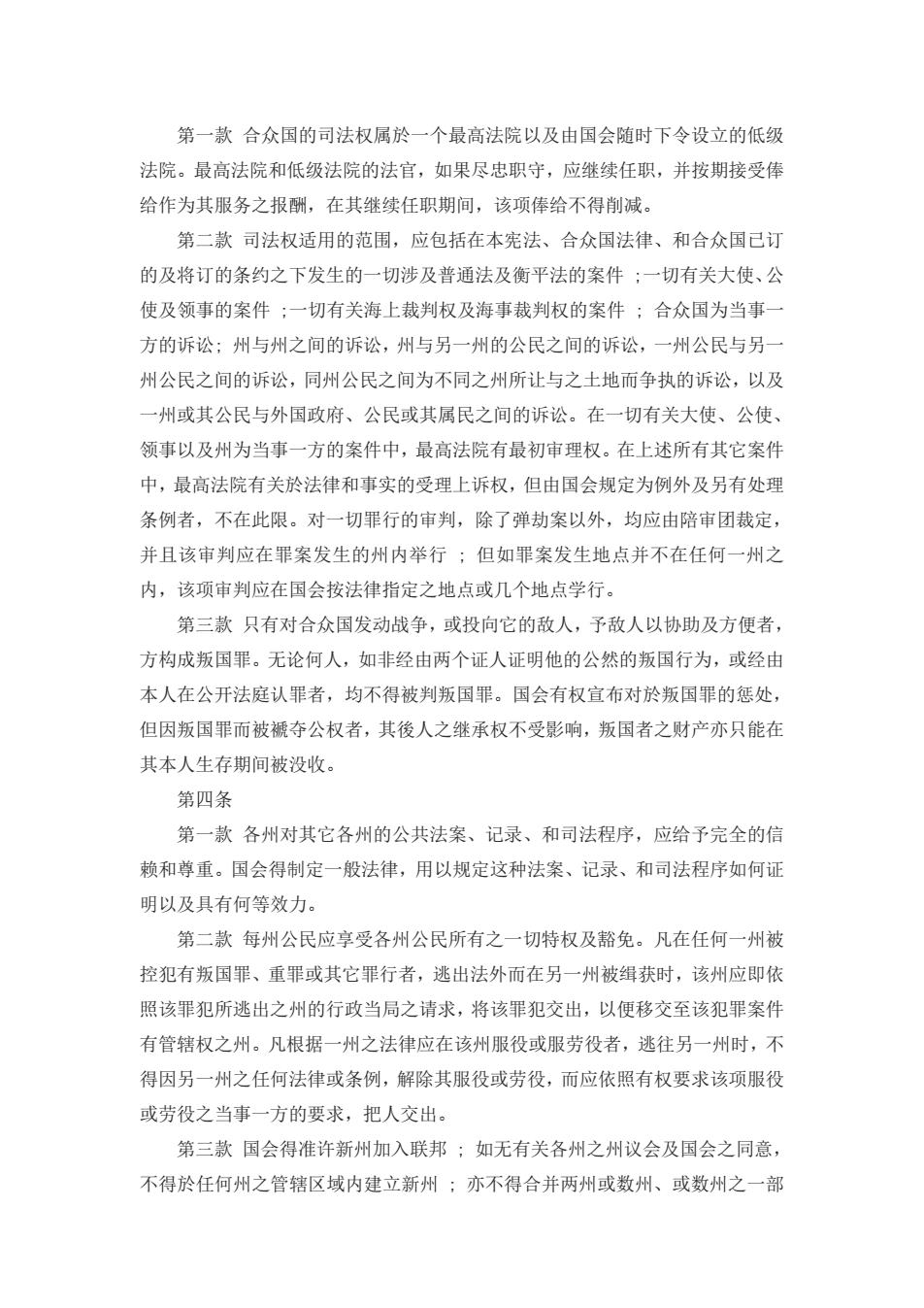
第一款合众国的司法权属於一个最高法院以及由国会随时下令设立的低级 法院。最高法院和低级法院的法官,如果尽忠职守,应继续任职,并按期接受俸 给作为其服务之报酬,在其继续任职期间,该项俸给不得削减。 第二款司法权适用的范围,应包括在本宪法、合众国法律、和合众国已订 的及将订的条约之下发生的一切涉及普通法及衡平法的案件:一切有关大使、公 使及领事的案件;一切有关海上裁判权及海事裁判权的案件;合众国为当事一 方的诉讼;州与州之间的诉讼,州与另一州的公民之间的诉讼,一州公民与另一 州公民之间的诉讼,同州公民之间为不同之州所让与之土地而争执的诉讼,以及 一州或其公民与外国政府、公民或其属民之间的诉讼。在一切有关大使、公使、 领事以及州为当事一方的案件中,最高法院有最初审理权。在上述所有其它案件 中,最高法院有关於法律和事实的受理上诉权,但由国会规定为例外及另有处理 条例者,不在此限。对一切罪行的审判,除了弹劫案以外,均应由陪审团裁定, 并且该审判应在罪案发生的州内举行;但如罪案发生地点并不在任何一州之 内,该项审判应在国会按法律指定之地点或几个地点学行。 第三款只有对合众国发动战争,或投向它的敌人,予敌人以协助及方便者, 方构成叛国罪。无论何人,如非经由两个证人证明他的公然的叛国行为,或经由 本人在公开法庭认罪者,均不得被判叛国罪。国会有权宣布对於叛国罪的惩处, 但因叛国罪而被褫夺公权者,其後人之继承权不受影响,叛国者之财产亦只能在 其本人生存期间被没收。 第四条 第一款各州对其它各州的公共法案、记录、和司法程序,应给予完全的信 赖和尊重。国会得制定一般法律,用以规定这种法案、记录、和司法程序如何证 明以及具有何等效力。 第二款每州公民应享受各州公民所有之一切特权及豁免。凡在任何一州被 控犯有叛国罪、重罪或其它罪行者,逃出法外而在另一州被缉获时,该州应即依 照该罪犯所逃出之州的行政当局之请求,将该罪犯交出,以便移交至该犯罪案件 有管辖权之州。凡根据一州之法律应在该州服役或服劳役者,逃往另一州时,不 得因另一州之任何法律或条例,解除其服役或劳役,而应依照有权要求该项服役 或劳役之当事一方的要求,把人交出。 第三款国会得准许新州加入联邦;如无有关各州之州议会及国会之同意, 不得於任何州之管辖区域内建立新州;亦不得合并两州或数州、或数州之一部
第一款 合众国的司法权属於一个最高法院以及由国会随时下令设立的低级 法院。最高法院和低级法院的法官,如果尽忠职守,应继续任职,并按期接受俸 给作为其服务之报酬,在其继续任职期间,该项俸给不得削减。 第二款 司法权适用的范围,应包括在本宪法、合众国法律、和合众国已订 的及将订的条约之下发生的一切涉及普通法及衡平法的案件 ;一切有关大使、公 使及领事的案件 ;一切有关海上裁判权及海事裁判权的案件 ; 合众国为当事一 方的诉讼; 州与州之间的诉讼,州与另一州的公民之间的诉讼,一州公民与另一 州公民之间的诉讼,同州公民之间为不同之州所让与之土地而争执的诉讼,以及 一州或其公民与外国政府、公民或其属民之间的诉讼。在一切有关大使、公使、 领事以及州为当事一方的案件中,最高法院有最初审理权。在上述所有其它案件 中,最高法院有关於法律和事实的受理上诉权,但由国会规定为例外及另有处理 条例者,不在此限。对一切罪行的审判,除了弹劫案以外,均应由陪审团裁定, 并且该审判应在罪案发生的州内举行 ; 但如罪案发生地点并不在任何一州之 内,该项审判应在国会按法律指定之地点或几个地点学行。 第三款 只有对合众国发动战争,或投向它的敌人,予敌人以协助及方便者, 方构成叛国罪。无论何人,如非经由两个证人证明他的公然的叛国行为,或经由 本人在公开法庭认罪者,均不得被判叛国罪。国会有权宣布对於叛国罪的惩处, 但因叛国罪而被褫夺公权者,其後人之继承权不受影响,叛国者之财产亦只能在 其本人生存期间被没收。 第四条 第一款 各州对其它各州的公共法案、记录、和司法程序,应给予完全的信 赖和尊重。国会得制定一般法律,用以规定这种法案、记录、和司法程序如何证 明以及具有何等效力。 第二款 每州公民应享受各州公民所有之一切特权及豁免。凡在任何一州被 控犯有叛国罪、重罪或其它罪行者,逃出法外而在另一州被缉获时,该州应即依 照该罪犯所逃出之州的行政当局之请求,将该罪犯交出,以便移交至该犯罪案件 有管辖权之州。凡根据一州之法律应在该州服役或服劳役者,逃往另一州时,不 得因另一州之任何法律或条例,解除其服役或劳役,而应依照有权要求该项服役 或劳役之当事一方的要求,把人交出。 第三款 国会得准许新州加入联邦 ; 如无有关各州之州议会及国会之同意, 不得於任何州之管辖区域内建立新州 ; 亦不得合并两州或数州、或数州之一部
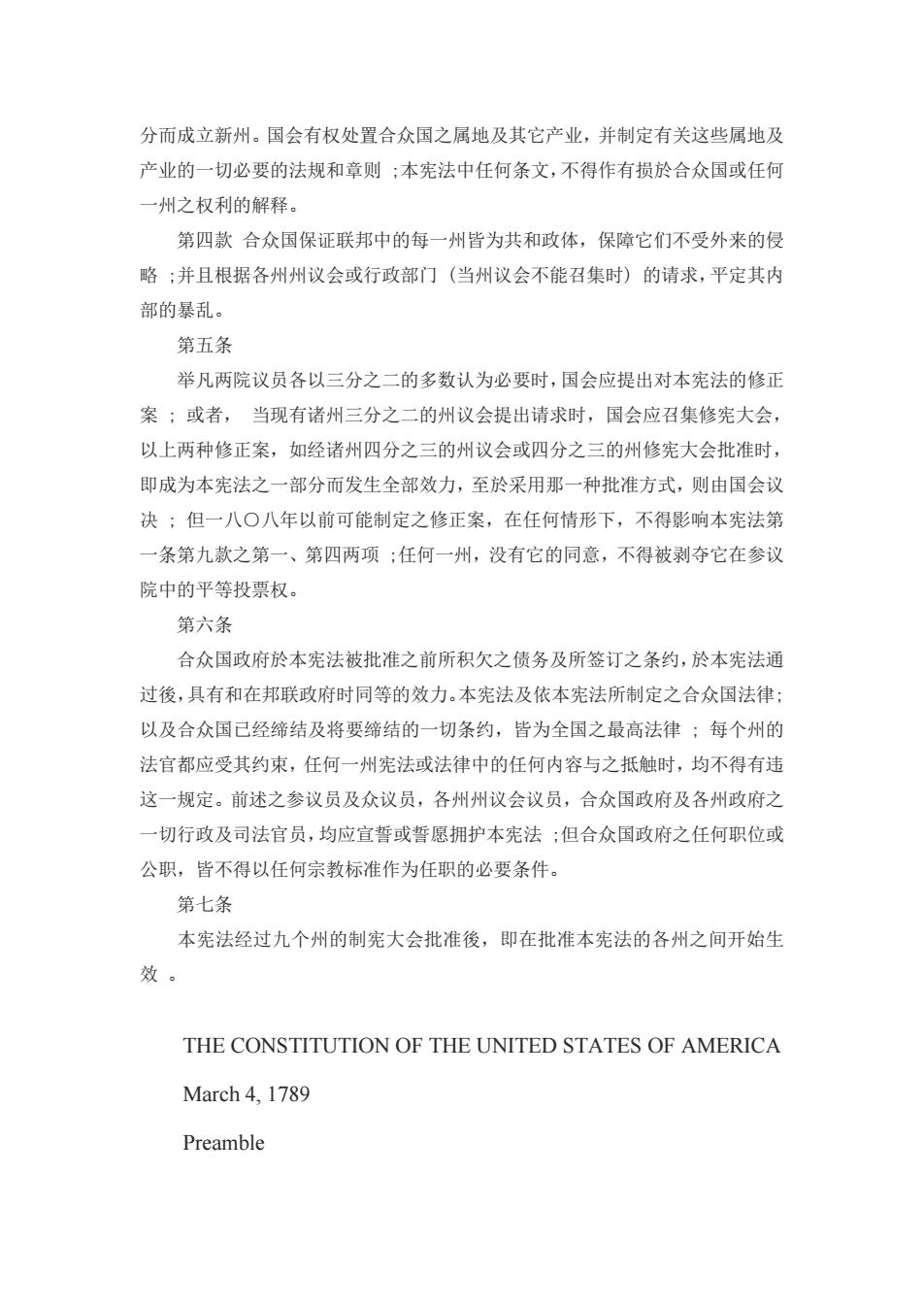
分而成立新州。国会有权处置合众国之属地及其它产业,并制定有关这些属地及 产业的一切必要的法规和章则:本宪法中任何条文,不得作有损於合众国或任何 一州之权利的解释。 第四款合众国保证联邦中的每一州皆为共和政体,保障它们不受外来的侵 略;并且根据各州州议会或行政部门(当州议会不能召集时)的请求,平定其内 部的暴乱。 第五条 举凡两院议员各以三分之二的多数认为必要时,国会应提出对本宪法的修正 案;或者,当现有诸州三分之二的州议会提出请求时,国会应召集修宪大会, 以上两种修正案,如经诸州四分之三的州议会或四分之三的州修宪大会批准时, 即成为本宪法之一部分而发生全部效力,至於采用那一种批准方式,则由国会议 决;但一八O八年以前可能制定之修正案,在任何情形下,不得影响本宪法第 一条第九款之第一、第四两项;任何一州,没有它的同意,不得被剥夺它在参议 院中的平等投票权。 第六条 合众国政府於本宪法被批准之前所积欠之债务及所签订之条约,於本宪法通 过後,具有和在邦联政府时同等的效力。本宪法及依本宪法所制定之合众国法律: 以及合众国已经缔结及将要缔结的一切条约,皆为全国之最高法律;每个州的 法官都应受其约束,任何一州宪法或法律中的任何内容与之抵触时,均不得有违 这一规定。前述之参议员及众议员,各州州议会议员,合众国政府及各州政府之 一切行政及司法官员,均应宣誓或誓愿拥护本宪法;但合众国政府之任何职位或 公职,皆不得以任何宗教标准作为任职的必要条件。 第七条 本宪法经过九个州的制宪大会批准後,即在批准本宪法的各州之间开始生 效。 THE CONSTITUTION OF THE UNITED STATES OF AMERICA March 4.1789 Preamble
分而成立新州。国会有权处置合众国之属地及其它产业,并制定有关这些属地及 产业的一切必要的法规和章则 ;本宪法中任何条文,不得作有损於合众国或任何 一州之权利的解释。 第四款 合众国保证联邦中的每一州皆为共和政体,保障它们不受外来的侵 略 ;并且根据各州州议会或行政部门 (当州议会不能召集时) 的请求,平定其内 部的暴乱。 第五条 举凡两院议员各以三分之二的多数认为必要时,国会应提出对本宪法的修正 案 ; 或者, 当现有诸州三分之二的州议会提出请求时,国会应召集修宪大会, 以上两种修正案,如经诸州四分之三的州议会或四分之三的州修宪大会批准时, 即成为本宪法之一部分而发生全部效力,至於采用那一种批准方式,则由国会议 决 ; 但一八○八年以前可能制定之修正案,在任何情形下,不得影响本宪法第 一条第九款之第一、第四两项 ;任何一州,没有它的同意,不得被剥夺它在参议 院中的平等投票权。 第六条 合众国政府於本宪法被批准之前所积欠之债务及所签订之条约,於本宪法通 过後,具有和在邦联政府时同等的效力。本宪法及依本宪法所制定之合众国法律; 以及合众国已经缔结及将要缔结的一切条约,皆为全国之最高法律 ; 每个州的 法官都应受其约束,任何一州宪法或法律中的任何内容与之抵触时,均不得有违 这一规定。前述之参议员及众议员,各州州议会议员,合众国政府及各州政府之 一切行政及司法官员,均应宣誓或誓愿拥护本宪法 ;但合众国政府之任何职位或 公职,皆不得以任何宗教标准作为任职的必要条件。 第七条 本宪法经过九个州的制宪大会批准後,即在批准本宪法的各州之间开始生 效 。 THE CONSTITUTION OF THE UNITED STATES OF AMERICA March 4, 1789 Preamble
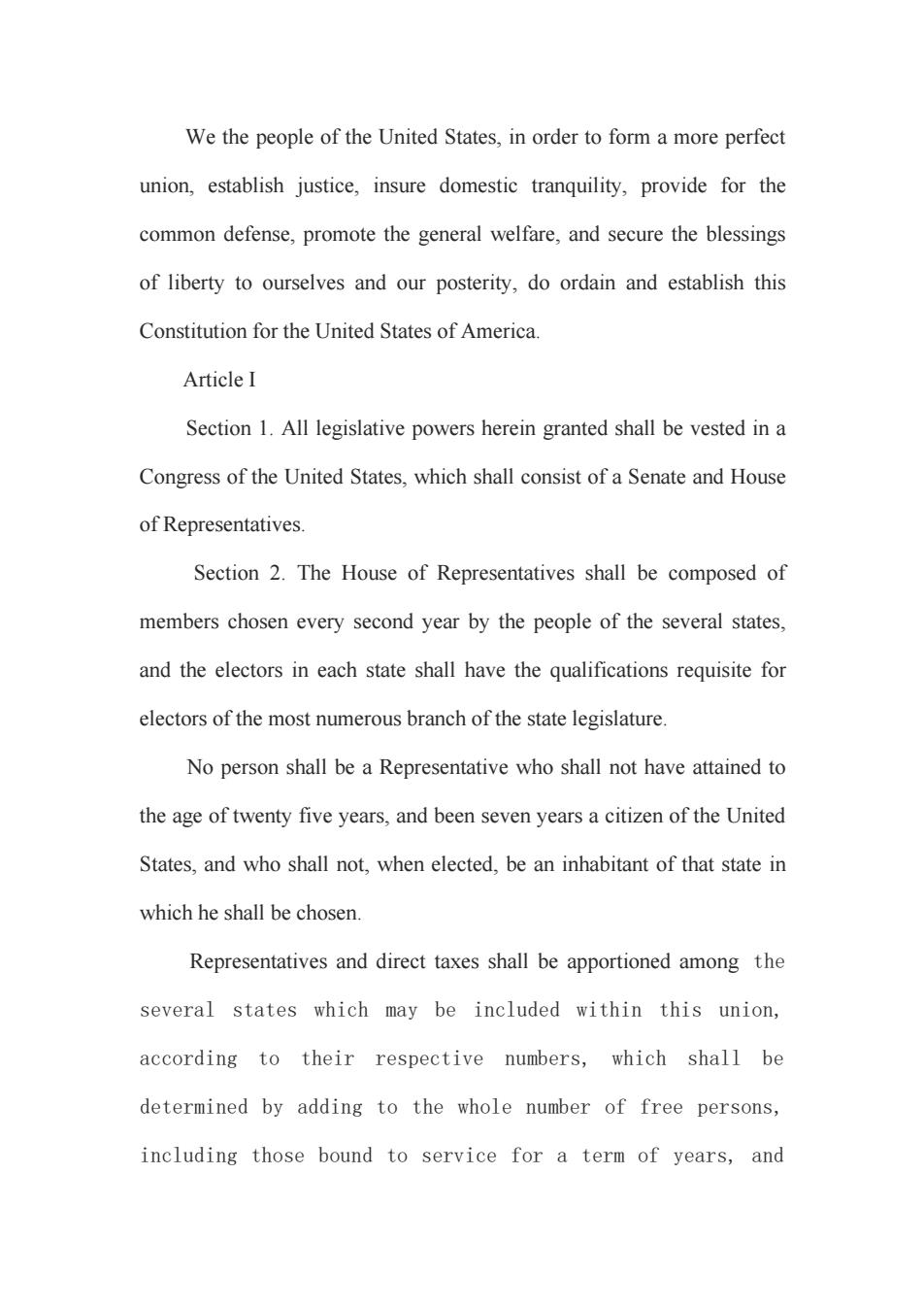
We the people of the United States,in order to form a more perfect union,establish justice,insure domestic tranquility,provide for the common defense,promote the general welfare,and secure the blessings of liberty to ourselves and our posterity,do ordain and establish this Constitution for the United States of America. Article I Section 1.All legislative powers herein granted shall be vested in a Congress of the United States,which shall consist of a Senate and House of Representatives. Section 2.The House of Representatives shall be composed of members chosen every second year by the people of the several states, and the electors in each state shall have the qualifications requisite for electors of the most numerous branch of the state legislature. No person shall be a Representative who shall not have attained to the age of twenty five years,and been seven years a citizen of the United States,and who shall not,when elected,be an inhabitant of that state in which he shall be chosen. Representatives and direct taxes shall be apportioned among the several states which may be included within this union, according to their respective numbers,which shall be determined by adding to the whole number of free persons, including those bound to service for a term of years,and
We the people of the United States, in order to form a more perfect union, establish justice, insure domestic tranquility, provide for the common defense, promote the general welfare, and secure the blessings of liberty to ourselves and our posterity, do ordain and establish this Constitution for the United States of America. Article I Section 1. All legislative powers herein granted shall be vested in a Congress of the United States, which shall consist of a Senate and House of Representatives. Section 2. The House of Representatives shall be composed of members chosen every second year by the people of the several states, and the electors in each state shall have the qualifications requisite for electors of the most numerous branch of the state legislature. No person shall be a Representative who shall not have attained to the age of twenty five years, and been seven years a citizen of the United States, and who shall not, when elected, be an inhabitant of that state in which he shall be chosen. Representatives and direct taxes shall be apportioned among the several states which may be included within this union, according to their respective numbers, which shall be determined by adding to the whole number of free persons, including those bound to service for a term of years, and
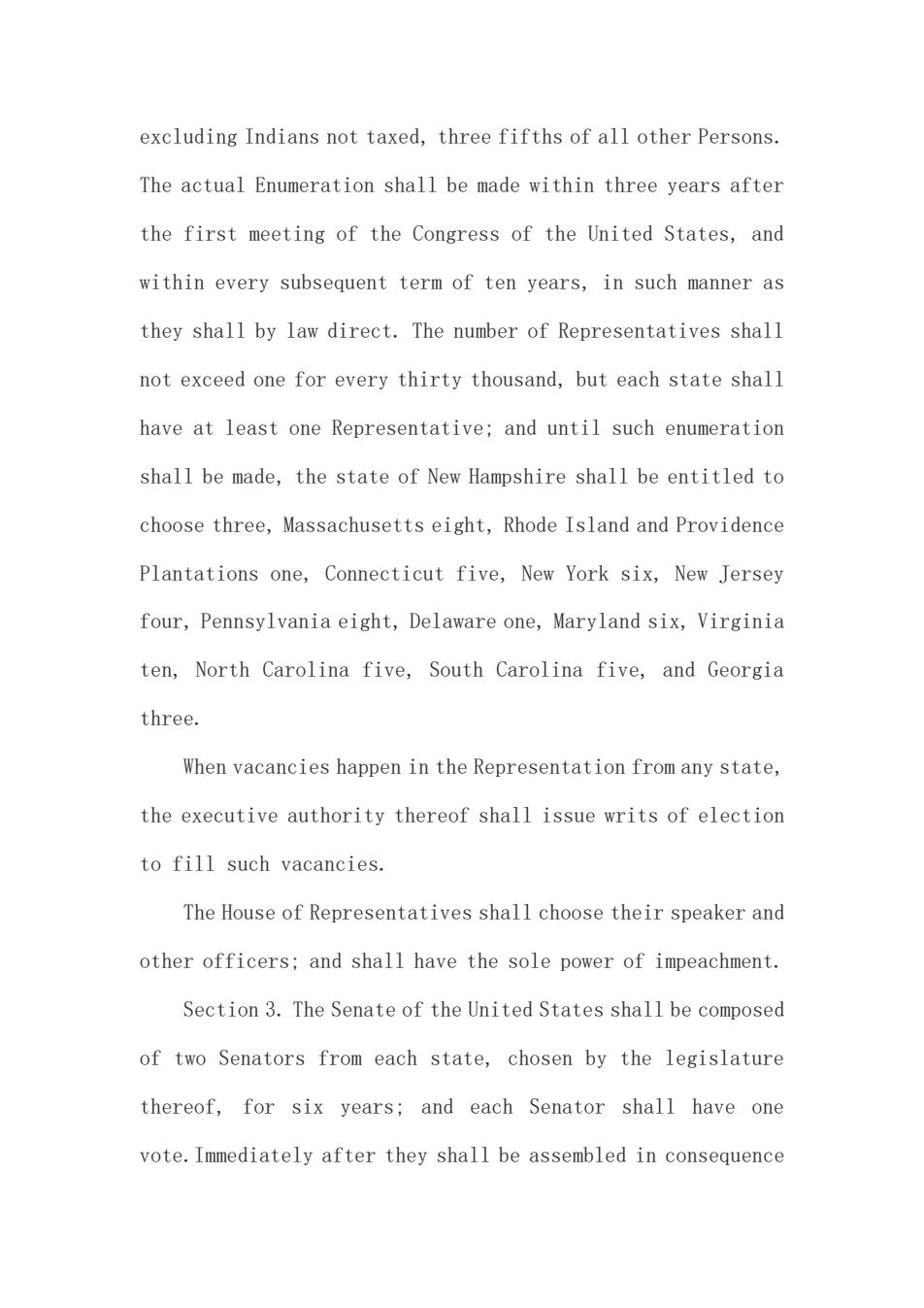
excluding Indians not taxed,three fifths of all other Persons. The actual Enumeration shall be made within three years after the first meeting of the Congress of the United States,and within every subsequent term of ten years,in such manner as they shall by law direct.The number of Representatives shall not exceed one for every thirty thousand,but each state shall have at least one Representative;and until such enumeration shall be made,the state of New Hampshire shall be entitled to choose three,Massachusetts eight,Rhode Island and Providence Plantations one,Connecticut five,New York six,New Jersey four,Pennsylvania eight,Delaware one,Maryland six,Virginia ten,North Carolina five,South Carolina five,and Georgia three. When vacancies happen in the Representation from any state, the executive authority thereof shall issue writs of election to fill such vacancies. The House of Representatives shall choose their speaker and other officers;and shall have the sole power of impeachment. Section 3.The Senate of the United States shall be composed of two Senators from each state,chosen by the legislature thereof,for six years;and each Senator shall have one vote.Immediately after they shall be assembled in consequence
excluding Indians not taxed, three fifths of all other Persons. The actual Enumeration shall be made within three years after the first meeting of the Congress of the United States, and within every subsequent term of ten years, in such manner as they shall by law direct. The number of Representatives shall not exceed one for every thirty thousand, but each state shall have at least one Representative; and until such enumeration shall be made, the state of New Hampshire shall be entitled to choose three, Massachusetts eight, Rhode Island and Providence Plantations one, Connecticut five, New York six, New Jersey four, Pennsylvania eight, Delaware one, Maryland six, Virginia ten, North Carolina five, South Carolina five, and Georgia three. When vacancies happen in the Representation from any state, the executive authority thereof shall issue writs of election to fill such vacancies. The House of Representatives shall choose their speaker and other officers; and shall have the sole power of impeachment. Section 3. The Senate of the United States shall be composed of two Senators from each state, chosen by the legislature thereof, for six years; and each Senator shall have one vote.Immediately after they shall be assembled in consequence
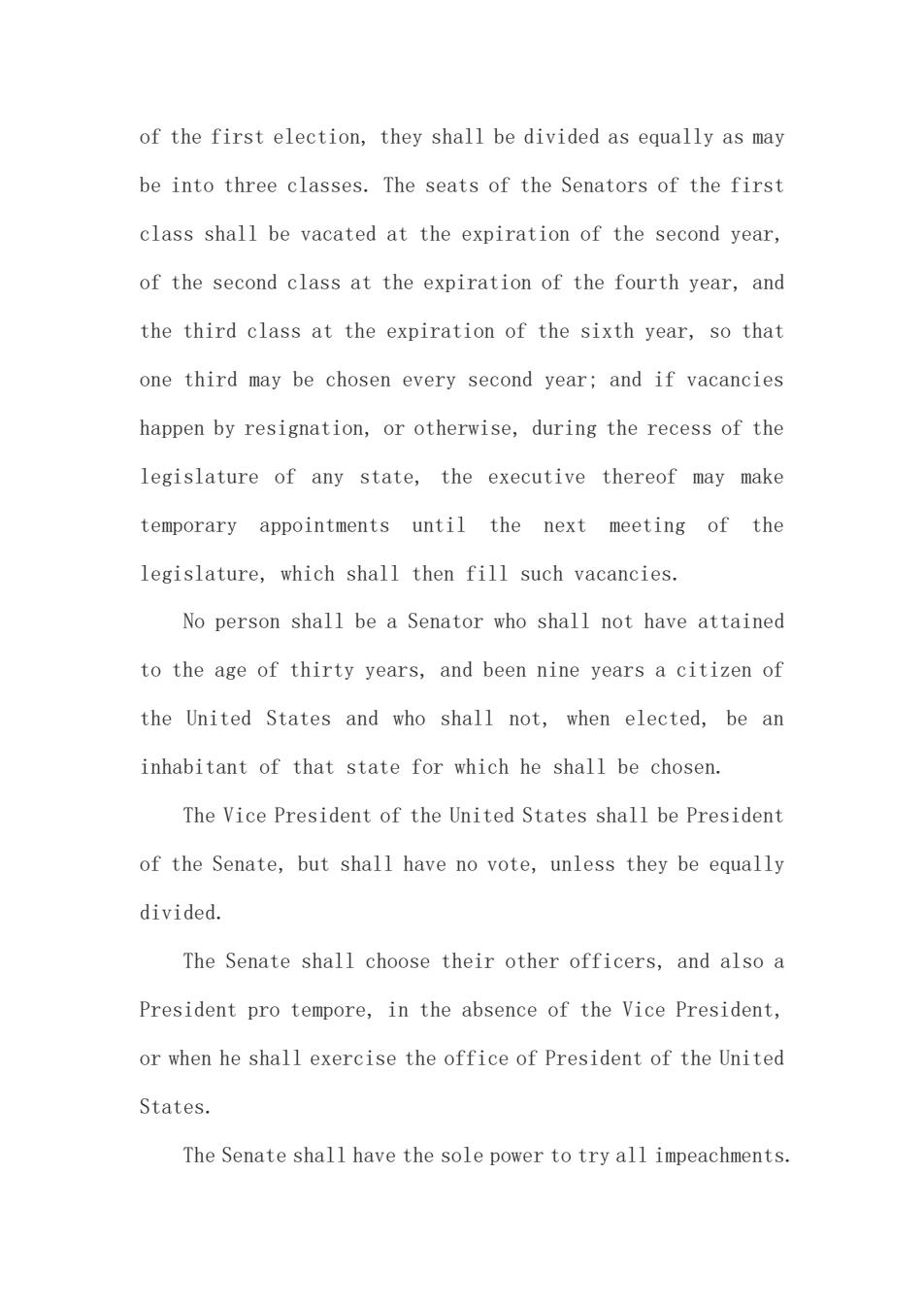
of the first election,they shall be divided as equally as may be into three classes.The seats of the Senators of the first class shall be vacated at the expiration of the second year, of the second class at the expiration of the fourth year,and the third class at the expiration of the sixth year,so that one third may be chosen every second year;and if vacancies happen by resignation,or otherwise,during the recess of the legislature of any state,the executive thereof may make temporary appointments until the next meeting of the legislature,which shall then fill such vacancies. No person shall be a Senator who shall not have attained to the age of thirty years,and been nine years a citizen of the United States and who shall not,when elected,be an inhabitant of that state for which he shall be chosen. The Vice President of the United States shall be President of the Senate,but shall have no vote,unless they be equally divided. The Senate shall choose their other officers,and also a President pro tempore,in the absence of the vice President, or when he shall exercise the office of President of the United States. The Senate shall have the sole power to try all impeachments
of the first election, they shall be divided as equally as may be into three classes. The seats of the Senators of the first class shall be vacated at the expiration of the second year, of the second class at the expiration of the fourth year, and the third class at the expiration of the sixth year, so that one third may be chosen every second year; and if vacancies happen by resignation, or otherwise, during the recess of the legislature of any state, the executive thereof may make temporary appointments until the next meeting of the legislature, which shall then fill such vacancies. No person shall be a Senator who shall not have attained to the age of thirty years, and been nine years a citizen of the United States and who shall not, when elected, be an inhabitant of that state for which he shall be chosen. The Vice President of the United States shall be President of the Senate, but shall have no vote, unless they be equally divided. The Senate shall choose their other officers, and also a President pro tempore, in the absence of the Vice President, or when he shall exercise the office of President of the United States. The Senate shall have the sole power to try all impeachments